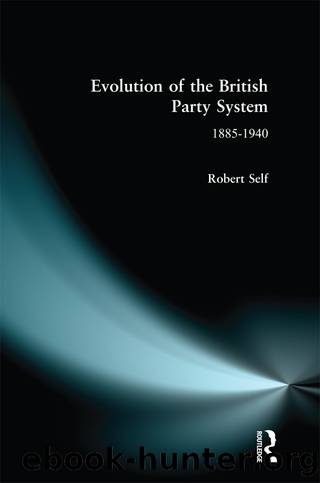Evolution of the British Party System by Robert C. Self

Author:Robert C. Self [Self, Robert C.]
Language: eng
Format: epub
Tags: History, General, Europe, Great Britain
ISBN: 9781317877813
Google: nMAeBAAAQBAJ
Publisher: Routledge
Published: 2014-07-30T01:23:57+00:00
6.3 Conservatism and the challenge of war
It is often suggested that the vigorous prosecution of war raised no fundamental problems for the Conservatives. In particular, Trevor Wilson makes much of the contrast in ideological tensions: 'If the war carried with it a certain menace for Liberals, Labour and Irish Nationalists, it was full of promise for the Conservatives.'34 Unquestionably, as the party of chauvinism and Empire, war enabled them to speak the language of super-patriotism with a new fluency with which none of their rivals could plausibly compete. Once war was declared, Conservatives were equally confident in responding with an unswerving patriotic zeal unencumbered by political scruple, tradition or ideology. Official partisanship went into abeyance on 6 August and thereafter party officials and activists busied themselves with war work like the Parliamentary Recruiting Committee which ran the national campaign for the first eighteen months of the war through party rather than national channels.35 In 1917, War Savings and the War Aims movement provided a new focus for Conservative patriotic endeavour. In this sense, therefore, war resolved many of the problems of Edwardian Conservatism by conferring a sense of overwhelming purpose. The negative spirit channelled into the battle for Ulster was turned more constructively and with greater confidence into the patriotic war.
War undoubtedly also brought the Conservatives some ideological benefits. For example, the McKenna duties breached the free trade edifice in a way that a decade of Chamberlainite campaigning had not. Yet in assessing the impact of war upon Conservative principles it is necessary to distinguish generally between legalâpolitical issues and those in the socio-economic sphere. Certainly Conservatives experienced none of the difficulty of their Liberal adversaries in embracing the curtailment of individual liberty or conscription, but given all that had happened since 1906 it is more difficult to accept the argument that the Conservatives actually drew strength from the fact that it was 'sure about ends and pragmatic as to means', even where this involved the enlargement of the collectivist State.36 Indeed, in the economic sphere, Conservatives were compelled to swallow some extremely unpalatable concessions over greater State interference with private property. The Rent Restrictions Act of 1915 showed how the government could be stampeded into curtailing the rights of property in favour of morale even where there was no proven profiteering. The State also took sweeping new powers of control over industry and agriculture which these disgruntled Conservatives rapidly dismantled after the Armistice. In the realm of taxation, war imposed a heavy burden on the party of property and the possessing classes. Income tax was raised from 9d (3p) to six shillings (30p) in the pound, while the tax threshold was reduced to only £120 p.a. Corresponding increases were introduced in super-tax and death duties, thereby accelerating the dramatic destruction of landed estates in the early postwar years.37 Worse still, Conservatives were not only unable to resist such imposts when demanded as a patriotic duty, but they also recognised that once conceded the onus would be on property to justify their removal when peace returned.
Download
This site does not store any files on its server. We only index and link to content provided by other sites. Please contact the content providers to delete copyright contents if any and email us, we'll remove relevant links or contents immediately.
| Africa | Americas |
| Arctic & Antarctica | Asia |
| Australia & Oceania | Europe |
| Middle East | Russia |
| United States | World |
| Ancient Civilizations | Military |
| Historical Study & Educational Resources |
Machine Learning at Scale with H2O by Gregory Keys | David Whiting(4289)
Never by Ken Follett(3929)
Fairy Tale by Stephen King(3365)
Oathbringer (The Stormlight Archive, Book 3) by Brandon Sanderson(3121)
The Man Who Died Twice by Richard Osman(3060)
Will by Will Smith(2899)
Rationality by Steven Pinker(2346)
Can't Hurt Me: Master Your Mind and Defy the Odds - Clean Edition by David Goggins(2317)
The Dark Hours by Michael Connelly(2299)
Friends, Lovers, and the Big Terrible Thing by Matthew Perry(2211)
The Dawn of Everything: A New History of Humanity by David Graeber & David Wengrow(2185)
Principles for Dealing With the Changing World Order: Why Nations Succeed and Fail by Ray Dalio(2028)
HBR's 10 Must Reads 2022 by Harvard Business Review(1832)
A Short History of War by Jeremy Black(1831)
Go Tell the Bees That I Am Gone by Diana Gabaldon(1746)
A Game of Thrones (The Illustrated Edition) by George R. R. Martin(1705)
515945210 by Unknown(1660)
Kingdom of Ash by Maas Sarah J(1658)
443319537 by Unknown(1541)
